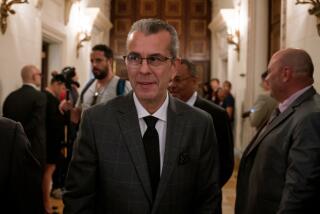Iraqi election recount begins and criticism quickly follows
- Share via
Reporting from Baghdad — Iraqi election officials on Monday launched a recount of votes cast in Baghdad during March elections but almost immediately drew fire from a key supporter of Prime Minister Nouri Maliki, whose party initially requested the second tally. The dispute further dimmed prospects for the quick formation of a new government.
Iraq’s independent election commission said it would take “two weeks or even three” to finish the recount.
Iraqis and Western observers fear stretching out the formation of the new government could further allow security to deteriorate and endanger a plan to pull about 50,000 American troops out of the country by September.
“I think everyone is looking to the Independent High Electoral Commission to finish this job as soon as possible because any kind of delay will have consequences and interpretations,” Faraj Haidari, chief of the election commission, told reporters at a nationally televised news conference.
Haidari’s commission began recounting as many as 2.5 million ballots cast in the capital during March 7 national elections, whose results so far have proved inconclusive.
The electoral list led by former Prime Minister Iyad Allawi beat Maliki’s bloc by two seats nationwide, appearing to give Allawi first crack at forming a new government. But Maliki, armed with a preelection court order allowing political lists to combine their seat totals with those of other blocs, has been maneuvering to gain an edge on both Allawi and other political blocs so he can retain his post and form a government.
Shortly after the recount began, a Maliki ally took to the airwaves to denounce the effort as inadequate. He demanded that the electoral commission undertake the laborious task of comparing the number of ballots with the number of voter registration signatures.
“If the [election commission] does not oblige with this process, we will keep our right to follow up the case legally until we guarantee that the results announced express the voters’ will,” said the ally, Iraqi Oil Minister Hussein Shahristani.
Maliki’s latest move follows a secretive commission’s decision to challenge pro-Allawi candidates for being alleged members of the outlawed Baath Party. It further raises fears that an election praised by international observers for its credibility and transparency could be undermined, stripping away faith in the political process and reigniting a sectarian civil war that has dramatically cooled.
Iraqis appear “more frustrated than anyone that coming up on two months after the elections they haven’t seen any progress on the next government,” Gary Grappo, head of the U.S. Embassy’s political section, told reporters at a briefing Sunday.
Some worry that other political blocs will also challenge vote results in other cities, as Iraq’s main Kurdish list was poised to do over the northern city of Kirkuk. It ultimately refrained, citing the national interest.
“The recount will bring these kinds of clouds over the process and make the voters concerned,” said Leila Khafaji, a former lawmaker and member of the Islamic Supreme Council of Iraq, a Shiite Muslim party once close to Maliki. “We think one or two seats are not as important and serious as the credibility of the election itself.”
Times staff writers Usama Redha and Caesar Ahmed contributed to this report.
More to Read
Sign up for Essential California
The most important California stories and recommendations in your inbox every morning.
You may occasionally receive promotional content from the Los Angeles Times.













